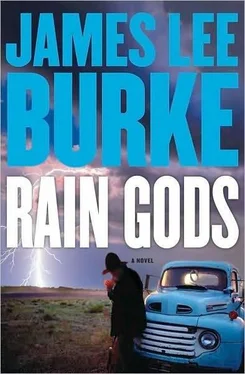Throughout the night, he could hear the wind stressing the storm shutters against their hooks and swelling under his house. He saw flashes of lightning in the clouds, the windmill in his south pasture shivering in momentary relief against the darkness, his horses running in the grass, clattering against the railed fence. He heard thunder ripping across the sky like a tin roof being slowly torn asunder by the hands of God. He sat on the side of his bed in his skivvies, his heavy blue-black white-handled revolver clenched in his hand.
He thought of Pam Tibbs and the way she had always covered his back and incessantly brought him food. He thought of the way her rump filled out her jeans and the bold way she carried herself and her mercurial moods that vacillated from a martial flash in the eyes to an invasive warmth that made him step back from her and put his hands in his back pockets.
Why think about her now, at this moment, as he sat on the side of his bed with the coldness of a pistol on his naked thigh, like an old fool who still thought he could be the giver of death rather than its recipient?
Because he was alone and his sons were far away, and because every unused second that clicked on the clock was an act of theft to which he was making himself party.
He went into the office at seven on Monday morning, hung his dove-colored hat on a wood peg on the wall, and pulled from his desk drawer the DMV fax that contained the 173 possible registrants of the Honda driven by Preacher Jack Collins. He flattened the pages on his ink blotter, placed a ruler under the name of the first registrant, and began working his way down the list. He had gotten through six names when the phone rang. The caller was not one he cared to hear from.
“Ethan Riser,” Hackberry said, trying to hide the resignation in his voice.
“I heard you had a bad day up at the game farm,” Riser said.
“Not as bad as the guys Jack Collins eased into the next world.”
“A couple of my colleagues say it was a real mess. They appreciated your help.”
“That’s funny, I don’t remember their saying that.”
“So you know about Nick Dolan’s wife?”
“No, not the particulars. Just what I got from this guy T-Bone Simmons.” Hackberry leaned forward on his desk, his back stiffening. “What about her?”
“She was carjacked or kidnapped, I guess it depends on how you want to put it. Her vehicle was found on a side road off I-10, just east of Segovia.”
“When did you know about this?”
“The day it happened, Saturday afternoon. Mr. Dolan is a little distraught. I thought maybe he’d called you by now.”
“Tell me this again. You knew Mrs. Dolan was abducted Saturday afternoon, but I have to hear about it from a dying criminal a day later? And you thought I had probably gotten word from the husband of the victim?”
“Or from my colleagues,” Riser said wearily. “Look, Sheriff, this is not the reason I called. We have information that indicates you may be giving sanctuary to Vikki Gaddis and Pete Flores.”
“I don’t know where you got that from, but I don’t really care. You know why the right-wing nutcases around here don’t trust the government?”
“No, I don’t.”
“That’s the point, sir. You don’t know. That’s the entire point.”
Hackberry hung up. Thirty seconds later, the phone rang again. He glanced at the caller ID, picked up the receiver, and without speaking, hung up a second time, his eyes returning to the list of names on the DMV fax.
Pam Tibbs came into his office and looked over his shoulder. “It sounded like you were talking to Ethan Riser,” she said.
“There’s no such thing as a conversation with Riser. The two voices you hear are Riser talking and his voice echoing.”
“Get enough sleep last night?”
He raised his head. She was silhouetted against the light from the window, the tips of her hair lit by the early sun. Behind her, he could see the silver flagpole and the flag popping hard in the breeze. “I didn’t eat breakfast. Let’s go down to the café.”
“I have a pile of stuff in my intake basket,” she said.
“No, you don’t,” he said, lifting his hat off the wood peg.
At the café, he ordered a steak, three scrambled eggs, grits, hash browns and gravy, fried tomatoes, toast and marmalade and orange juice and coffee.
“Think you can make it to lunch?” she said. Her fingers were knitted on top of the table. Her nails were clean and unpainted and closely clipped. There was a shine in her hair just like the light in polished mahogany. Behind her, tumbleweeds were bouncing through the streets, the tin roof on an old mechanic’s shed rattling, forked lightning striking the hills in the south. “You trying to make me uncomfortable?” she said.
“Why do you say that?”
“Looking at me like that.”
“Like what?”
Her eyes went away from him and came back. “You think I’m your daughter?”
“No.”
“Well-”
“Well, what?” he said.
“God!” she replied.
A calendar hung on a post not far from their booth. No one had folded back a page on it since June. The days in June had been marked off with a black felt-tip pen, up to the twenty-first. He wondered what event in June had been so important that someone had in effect indicated all the previous days were to be gotten past and rid of. Then he wondered why the events after June 21 were so lacking in significance that no one had even bothered to turn the calendar page to the following month.
“Know why people in jail use the term ‘stacking time’?” he said.
“It makes a collection of dimwits sound clever?”
“No, it makes them sound normal. The goal for most people is to get time out of the way. I learned that in No Name Valley, under the sewer grate. I counted the threads in my sweater so I wouldn’t have to think about the time being stolen from my life.”
She turned a University of Houston class ring on her finger. The waitress brought coffee and went away. Pam watched a church bus pass on the street, its headlights on in the mixture of blowing dust and rain. “You’re the most unusual man I’ve ever known, but not for the reasons you might think,” she said.
He tried to smile but was disturbed by the tenor in her voice.
“You’re blessed with an innate goodness the Communists couldn’t take away from you. But I think in your mind, Jack Collins has become the prison guard who tormented you in North Korea. Collins wants to make you over in his image. If you let him do that, he wins, and so does that prison guard in the POW camp.”
“You’re wrong. Collins is a defective amoeba. He’s not worth thinking about.”
“Lie to God, lie to your friends, but don’t lie to yourself.”
“If you’re going to talk church-basement psychology to me, would you lower your voice?”
“There’s no one sitting around us.”
He looked sideways and didn’t reply.
“Don’t blow me off, Hack.” She pushed her right hand across the table and bumped the tips of her stiffened fingers hard against his.
“Do you think I’d do that? Do you think any intelligent man would ever treat a woman like you with disrespect?”
She bit a hangnail on her thumb and looked at him in a peculiar fashion.
IN FRONT OF the office, Hackberry took one glance at the sky and unhooked the chain on the flagpole and lowered the flag in advance of the impending storm. He folded the flag in a tuck and placed it in his desk drawer. Then he went back to work on the list of registrants given to him by the DMV. He went through the entire list twice, his eyes starting to swim. What was the point? If the FBI couldn’t locate Collins, how could he? Did Collins actually possess magic? Was he a griffin loosed from the pit, a reminder of the bad seed that obviously existed in the gene pool? It was always easier to think of evil as the work of individuals rather than the successful and well-planned efforts of societies and organizations operating with a mandate. Men like Collins were not created simply by their environments. Auschwitz and the Nanking massacre hadn’t happened in a vacuum.
Читать дальше












